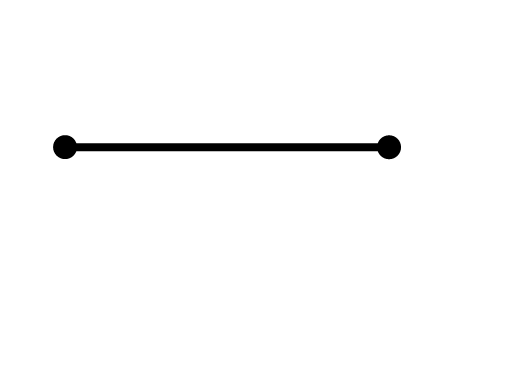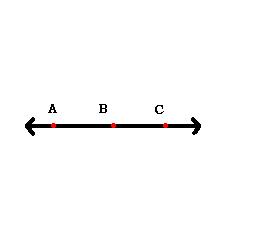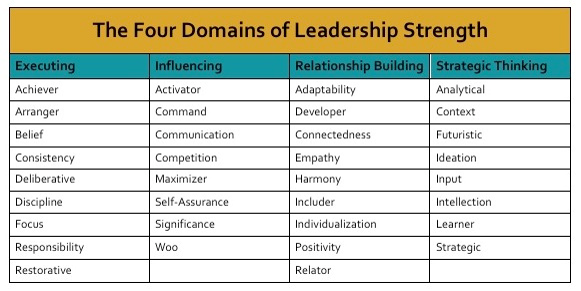3A. IDEATION IN CONNECTEDNESS
Ideation: The capacity for or the act of forming or entertaining ideas.
“There is nothing more powerful than an idea whose time has come.”
– Victor Hugo
I decided I should start with something that would make them think, put a smile on their face and get their attention.
No small order. So I began with a pop quiz …
Q. In what year was electricity invented?
A. Electricity was not invented. It was discovered.
This was more than an ‘ice breaker’ for the conversation. It led to the next important point.
3B. IDEATION IN CONNECTEDNESS
 This is Tom Rath. He’s the guy that put this StrengthsFinder thing together. Read carefully what he said.
This is Tom Rath. He’s the guy that put this StrengthsFinder thing together. Read carefully what he said.
I underlined some of the terms for a reason. He makes the point that the four domains of leadership “emerged” out of the data they accumulated. Below is the chart showing the 34 Strength categories as they fall under the four domains.
He further states that all of the 34 strengths “naturally cluster” into these four areas. The word “naturally” is important to remember going forward.
3C. IDEATION IN CONNECTEDNESS
 There is someone with something to share regarding that … It’s our old friend and sage, Stephen Covey again! He’s pointing out something interesting regarding the four StrengthsFinder domains which are; Influencing, strategic thinking, relationship building. In Covey’s books, he mention something he calls the Four Dimensions of Renewal,
There is someone with something to share regarding that … It’s our old friend and sage, Stephen Covey again! He’s pointing out something interesting regarding the four StrengthsFinder domains which are; Influencing, strategic thinking, relationship building. In Covey’s books, he mention something he calls the Four Dimensions of Renewal,  that consist of:
that consist of:
Spiritual, Value Clarification
Mental, Planning
Emotional, Synergy
Physical
So what’s the connection between the these two groups of four?
If we happen to put them in this order, side-by-side, we start to see similarities:

Rath Covey
Four Domains of Four Dimensions
Leadership Strength of Renewal
Influencing Spiritual Value Clarification
Strategic Thinking Mental, Planning
Relationship Building Emotional, Synergy
Executing Physical
3D. IDEATION IN CONNECTEDNESS
Let’s get a visual here using some geometric terms. What we’ve done so far is take two non-dimension points (StrengthsFinder and 7 Habits) and connected them, forming a one-dimensional line between them.
There is another aspect to cover here, that takes us from the concept of a line, which is “finite,” to that of a “ray” which is infinite, and to the geometric concept of “opposite rays,” which are two rays that both start from a common point and go off infinitely in exactly opposite directions.
Going back to what Tom Rath said about what they ‘discovered’ from their research:
““From this dataset, four distinct domains of leadership strength emerged … Executing, Influencing, Relationship Building, and Strategic Thinking.” … “The 34 StrengthsFinder themes naturally cluster into these four domains of leadership strength.”
Now let’s look at another Covey quote about where these ideas “come from.”
“Solutions to the problems are and always will be based upon universal, timeless, self-evident, principles common to every enduring, prospering society throughout history. I did not invent them and take no credit for them, I’ve simply identified and organized them into a sequential framework.”
– Stephen Covey
 When Roth says that what he discovered “naturally clustered” toward those four domains, the implication is that the latter already ‘existed.’ What Covey is expounding is that these, and other principles, have always existed through history.
When Roth says that what he discovered “naturally clustered” toward those four domains, the implication is that the latter already ‘existed.’ What Covey is expounding is that these, and other principles, have always existed through history.
This gives us a unidirectional ‘ray,’ in that they seem to have ‘always existed in the past until now.’ What takes it a step further, to that of ‘opposite rays’ infinite in both directions, is found in this quote from a very profound book and movie:
“These forces that often remake time and space, that can shape and alter who we imagine ourselves to be, begin long before we are born and continue after we perish.”
– ‘Cloud Atlas’
What we have now is the idea of a true “universal principle,” existing before and after us – one that our lives and ideas ‘intersect’ at some point, from where we define ourselves and everything around us.


